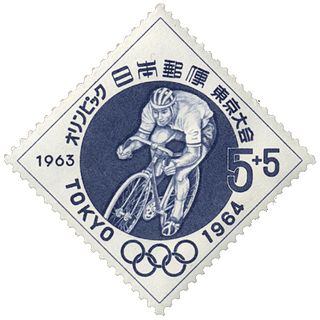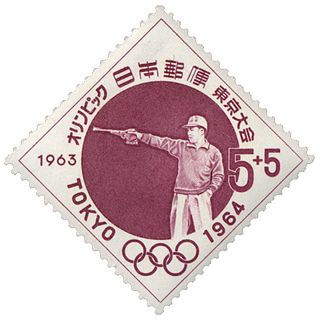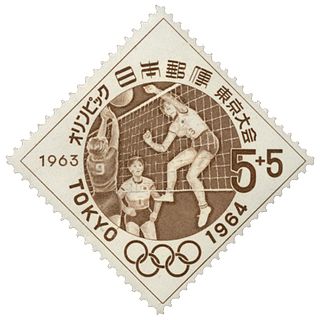 W
WAt the 1964 Summer Olympics in Tokyo, the athletics competition included 36 events, 24 for men and 12 for women. The women's 400 metres and women's pentathlon events were newly introduced at these Games. There were a total number of 1016 participating athletes from 82 countries.
 W
WBasketball contests at the 1964 Summer Olympics was the sixth appearance of the sport of basketball as an official Olympic medal event. It took place at the Yoyogi National Gymnasium in Tokyo, Japan from October 11 to October 23. The United States defeated the Soviet Union to win their sixth consecutive gold medal at this event, while Brazil earned the bronze against Puerto Rico.
 W
WCanoeing at the 1964 Summer Olympics was held between 20 October 1964 and 22 October 1964 on Lake Sagami, 60 kilometres from Sagamiko, Kanagawa, Japan. There were 7 events, 5 of which were for men and 2 for women. Both of the women's events were 500 metre kayaking events; there were three kayaking and two canoeing events for men, all of which covered 1000 metres. The K-4 event for men was introduced to the Olympic program at these Games, replacing the 4×500 metre K-1 event that was raced in the 1960 Games.
 W
WThe cycling competition at the 1964 Summer Olympics consisted of two road cycling events and five track cycling events, all for men only. The 4000m individual pursuit event was introduced at these Games.
 W
WAt the 1964 Summer Olympics in Tokyo, four diving events were contested during a competition that took place at the Yoyogi National Gymnasium, from 11 to 18 October, comprising 80 divers from 20 nations.
 W
WThe equestrian events at the 1964 Summer Olympics in Tokyo included show jumping, dressage and eventing. All three disciplines had both individual and team competitions. The competitions were held from 16 to 24 October 1964. These events took place at Karuizawa, which would become the first city to host Summer and Winter Olympic event when it hosted the curling events for the 1998 Winter Olympics in Nagano.
 W
WAt the 1964 Summer Olympics in Tokyo, eight events in fencing were contested. Men competed in both individual and team events for each of the three weapon types, but women competed only in foil events.
 W
WThe field hockey tournament at the 1964 Summer Olympics was the 10th edition of the field hockey event for men at the Summer Olympic Games. It was held from 11 to 23 October 1964. All games were played at the Komazawa Hockey Field in Tokyo, Japan.
 W
WThe football competition at the 1964 Summer Olympics started on 11 October and ended on 23 October. Only one event, the men's tournament, was contested. The tournament features 14 men's national teams from six continental confederations. The 14 teams are drawn into two groups of four and two groups of three and each group plays a round-robin tournament. At the end of the group stage, the top two teams advanced to the knockout stage, beginning with the quarter-finals and culminating with the gold medal match at the Olympic Stadium on 23 October 1964. There was also three consolation matches played by losing quarter-finalists. The winner of these matches placed fifth in the tournament.
 W
WAt the 1964 Summer Olympics, fourteen different artistic gymnastics events were contested, eight for men and six for women. All events were held at the Tokyo Metropolitan Gymnasium in Tokyo from 18 October through 23 October.
 W
WThe judo competition at the 1964 Summer Olympics was the first time the sport was included in the Summer Olympic Games. Medals were awarded in 4 classes, and competition was restricted to men only. The competition was held in the Nippon Budokan, which was built to host the competition.
 W
WThe modern pentathlon at the 1964 Summer Olympics was represented by two events : Individual competition and Team competition. As usual in Olympic modern pentathlon, one competition was held and each competitor's score was included to the Individual competition event results table and was also added to his teammates' scores to be included to the Team competition event results table. This competition consisted of 5 disciplines:Equestrian, held on October 11 at Asaka Nezu Park. Fencing, held on October 12 at Waseda Memorial Hall. Shooting, held on October 13 at Asaka Shooting Range. Swimming, held on October 14 at National Gymnasium. Cross-country, held on October 15 at Kemigawa.
 W
WRowing at the 1964 Summer Olympics featured seven events, for men only.
 W
WSailing/Yachting is an Olympic sport starting from the Games of the 1st Olympiad (1896 Olympics in Athens Greece. With the exception of 1904 and the canceled 1916 Summer Olympics, sailing has always been included on the Olympic schedule. The Sailing program of 1964 consisted of a total of five sailing classes. For each class, seven races were scheduled; these took place from 12 to 23 October 1964 off the coast of Enoshima in Sagami Bay. The sailing was done on the triangular type Olympic courses.
 W
WShooting at the 1964 Summer Olympics in Tokyo comprised six events, all for men only. They were held between 15 and 17 October 1964.
 W
WAt the 1964 Summer Olympics, eighteen swimming events were contested, ten for men and eight for women. There were a total of 405 participants from 42 countries competing. For the first time, the 4×100 metres freestyle relay for men and the 400 metres individual medley for both men and women were contested. Olympic records were broken in all events and the world record was broken in ten events. This competition also marked the debut of electronic touchpads for timing.
 W
WVolleyball at the 1964 Summer Olympics was represented by two events: men's team and women's team.
 W
WWater polo at the 1964 Summer Olympics was held at the Yoyogi National Gymnasium in Shibuya, Tokyo. The gymnasium was built in 1961-1964 as the first indoor pool for Olympic water polo; it also hosted all swimming and diving events and could accommodate over 13,000 people.
 W
WThe weightlifting competition at the 1964 Summer Olympics in Tokyo consisted of seven weight classes, all for men only. It also counted as 1964 World Weightlifting Championships.
 W
WAt the 1964 Summer Olympics, 16 wrestling events were contested, for all men. There were eight weight classes in Greco-Roman wrestling and eight classes in freestyle wrestling.